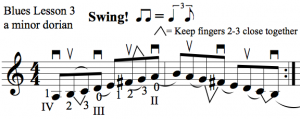Welcome to our forum. A Message To Our New and Prospective Members . Check out our Forum Rules. Lets keep this forum an enjoyable place to visit.
Check out our 2023 Group Christmas Project HERE
 Topic RSS
Topic RSS



 (0 votes)
(0 votes) Regulars
 Offline
OfflineI am trying to find out what makes a scale a dorian scale. I tried wikipedia and this is what I got.
the Dorian octave species was built upon two tetrachords (four-note segments) separated by a whole tone, running from the hypate meson to the nete diezeugmenon. In the enharmonic genus, the intervals in each tetrachord are quarter-tone–quarter-tone–major third; in the chromatic genus, semitone-semitone-minor third; in the diatonic genus, semitone-tone-tone. In the diatonic genus, the sequence over the octave is the same as that produced by playing all the white notes of a piano ascending from E to E: E F G A | B C D E,[
Now I'm more confused than ever.![]()
Regulars
Honorary tenured advisor
Regulars
 Offline
OfflineHere's my understanding of the dorian mode. The key of C major no sharps and no flats, right? If you begin on the second tone of the scale (d natural) and play an octave scale with the key signature of c, you are playing the d dorian scale, or mode.
There are other modes too.
C -> Ionian
D -> Dorian
E -> Phrygian
F -> Lydian
G -> Mixolydian
A -> Aeolian
B -> Locrian
Regulars
 Offline
OfflineHonorary tenured advisor
Regulars
 Offline
OfflineRegulars
Honorary tenured advisor
Regulars
 Offline
OfflineRegulars
Honorary tenured advisor
Regulars
 Offline
OfflineKevin M. said
I am trying to find out what makes a scale a dorian scale.
Ascending a scale is like going in a circle. The starting point of the scale is in a sense the same as its ending point. If you start on F#, then you end on F#, but an octave higher.
Imagine a clock, or draw one on paper. Put marks at 12, 2, 4, 5, 7, 9, and 11 o'clock. Start at noon and go clockwise, touching each mark as you go, but skipping the hours that are unmarked. If one hour represents a half step and two hours represent a whole step, then you have just ascended a major scale. If instead you start at 9 o'clock and go clockwise back to 9, you will have ascendeded a minor scale. If you start at 2 o'clock and go clockwise back to 2, you will have ascended a Dorian scale.
Major, minor, and Dorian are all diatonic scales, and the clock pattern 12, 2, 4, 5, 7, 9, 11 is characteristic of the diatonic scales. All the modes listed above by SaraO are diatonic. Major is the same as Ionian, and minor is the same as Aeolian. The seven modes just differ as to their starting point on the clock.
See also http://en.wikipedia.org/wiki/D.....cale#Modes , but the visual devices there are a little different from the clock image that I describe above.
King
Regulars
Honorary tenured advisor
Regulars
 Offline
Offlinecdennyb said
Awesome explanation... even I tend to understand now... Thank goodness for dredging up OLD THREADS! lol
Thank you! Now would it surprise you to know that, two minutes before I started reading this thread, I did not know what Dorian scales or diatonic scales were? However I was already pretty thoroughly aware of the natures of major and minor scales and the relation between them. So my mind was prepared to learn when I found this old thread.
1 Guest(s)


 Log In
Log In Register
Register Home
Home
















